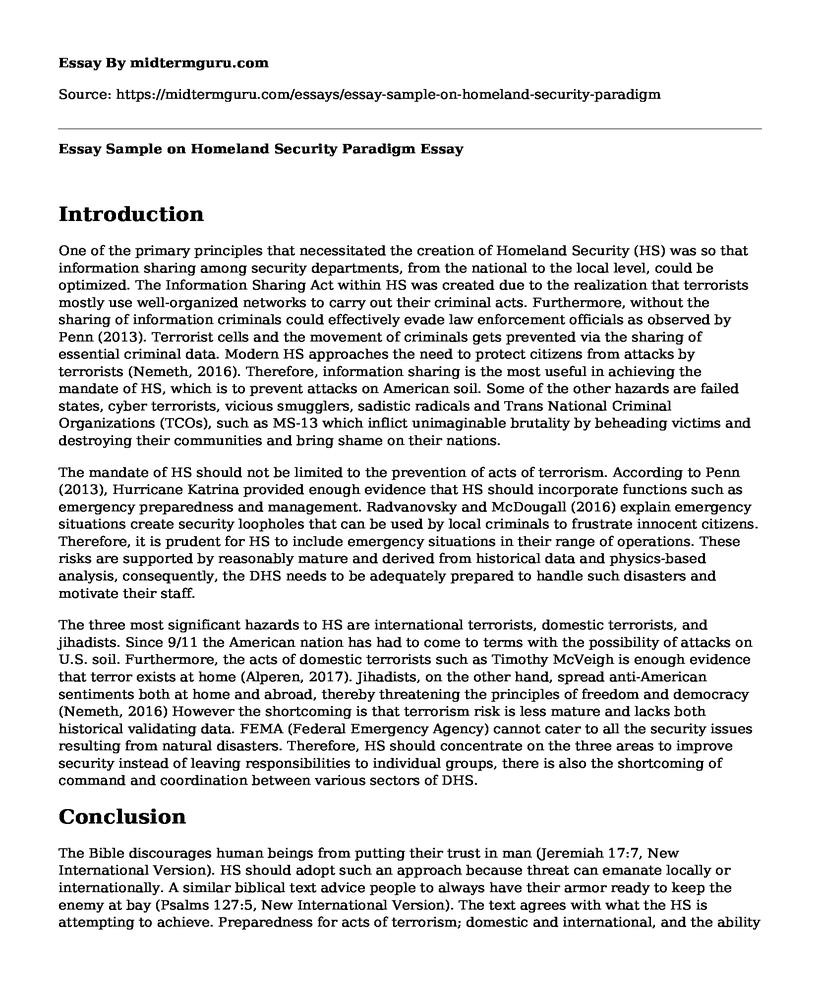Introduction
One of the primary principles that necessitated the creation of Homeland Security (HS) was so that information sharing among security departments, from the national to the local level, could be optimized. The Information Sharing Act within HS was created due to the realization that terrorists mostly use well-organized networks to carry out their criminal acts. Furthermore, without the sharing of information criminals could effectively evade law enforcement officials as observed by Penn (2013). Terrorist cells and the movement of criminals gets prevented via the sharing of essential criminal data. Modern HS approaches the need to protect citizens from attacks by terrorists (Nemeth, 2016). Therefore, information sharing is the most useful in achieving the mandate of HS, which is to prevent attacks on American soil. Some of the other hazards are failed states, cyber terrorists, vicious smugglers, sadistic radicals and Trans National Criminal Organizations (TCOs), such as MS-13 which inflict unimaginable brutality by beheading victims and destroying their communities and bring shame on their nations.
The mandate of HS should not be limited to the prevention of acts of terrorism. According to Penn (2013), Hurricane Katrina provided enough evidence that HS should incorporate functions such as emergency preparedness and management. Radvanovsky and McDougall (2016) explain emergency situations create security loopholes that can be used by local criminals to frustrate innocent citizens. Therefore, it is prudent for HS to include emergency situations in their range of operations. These risks are supported by reasonably mature and derived from historical data and physics-based analysis, consequently, the DHS needs to be adequately prepared to handle such disasters and motivate their staff.
The three most significant hazards to HS are international terrorists, domestic terrorists, and jihadists. Since 9/11 the American nation has had to come to terms with the possibility of attacks on U.S. soil. Furthermore, the acts of domestic terrorists such as Timothy McVeigh is enough evidence that terror exists at home (Alperen, 2017). Jihadists, on the other hand, spread anti-American sentiments both at home and abroad, thereby threatening the principles of freedom and democracy (Nemeth, 2016) However the shortcoming is that terrorism risk is less mature and lacks both historical validating data. FEMA (Federal Emergency Agency) cannot cater to all the security issues resulting from natural disasters. Therefore, HS should concentrate on the three areas to improve security instead of leaving responsibilities to individual groups, there is also the shortcoming of command and coordination between various sectors of DHS.
Conclusion
The Bible discourages human beings from putting their trust in man (Jeremiah 17:7, New International Version). HS should adopt such an approach because threat can emanate locally or internationally. A similar biblical text advice people to always have their armor ready to keep the enemy at bay (Psalms 127:5, New International Version). The text agrees with what the HS is attempting to achieve. Preparedness for acts of terrorism; domestic and international, and the ability to prevent or mitigate the effects of natural disasters is an important consideration for HS. Therefore, adopting a proactive policy as explained in the biblical text can optimize the mandate of HS.
References
Alperen, M. J. (2017). Foundations of Homeland Security: Law and Policy. Hoboken, NJ: Wiley.
Nemeth, C. P. (2016). Homeland Security: An Introduction to Principles and Practice. New York, NY: CRC Press.
Penn, E. B. (2013). Justice: Five Years After 9/11. New York, NY: Routledge.
Radvanovsky, R. S., & McDougall, A. (2016). Critical Infrastructure: Homeland Security and Emergency Preparedness. New York, NY: CRC Press.
Cite this page
Essay Sample on Homeland Security Paradigm. (2022, Sep 15). Retrieved from https://midtermguru.com/essays/essay-sample-on-homeland-security-paradigm
If you are the original author of this essay and no longer wish to have it published on the midtermguru.com website, please click below to request its removal:
- Essay on Should we Have Term Limits for Members of the US Congress?
- Annotated Bibliography: Police Brutality
- Paper Example on Security and Cyberterrorism
- Essay Sample on Policing: Purpose and Organization
- Media's Presentation of Mandela in 1985: Analysis of Aljazeera's Beliefs - Research Paper
- The Great Disparity: 30 yrs of Middle Class Perfection Shattered - Essay Sample
- Public Policy: A Key to Understanding Government Obligations - Essay Sample







